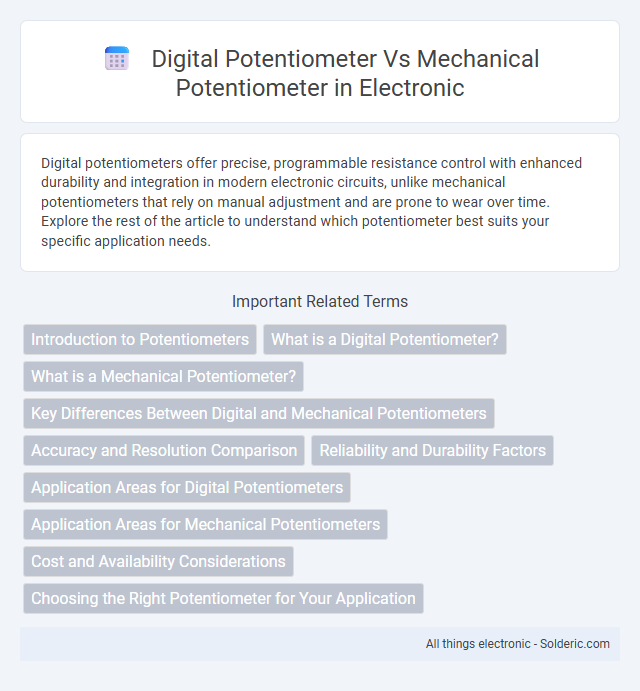Digital potentiometers offer precise, programmable resistance control with enhanced durability and integration in modern electronic circuits, unlike mechanical potentiometers that rely on manual adjustment and are prone to wear over time. Explore the rest of the article to understand which potentiometer best suits your specific application needs.
Comparison Table
| Feature | Digital Potentiometer | Mechanical Potentiometer |
|---|---|---|
| Control Type | Electronic (digital interface) | Manual (rotary or slide adjustment) |
| Precision | High, programmable steps | Moderate, depends on user adjustment |
| Durability | High, no mechanical wear | Lower, subject to wear and tear |
| Size | Compact, integrated circuit form | Bulkier, physical rotating parts |
| Adjustment Speed | Fast, electronic switching | Slower, manual turning required |
| Noise | Low electrical noise | Possible mechanical noise |
| Power Consumption | Requires supply voltage | No power needed |
| Application | Automated systems, remote control | Simple, manual tuning |
| Cost | Higher, advanced technology | Lower, basic component |
Introduction to Potentiometers
Potentiometers serve as adjustable voltage dividers widely used in electronic circuits for tuning and calibration. Mechanical potentiometers rely on a physical wiper moving along a resistive track, providing continuous analog control but susceptible to wear and environmental factors. Digital potentiometers use electronic components such as resistive arrays and integrated switches to achieve precise, programmable resistance values, enhancing durability and enabling remote adjustments in modern applications.
What is a Digital Potentiometer?
A digital potentiometer is an electronic component that mimics the function of a mechanical potentiometer using semiconductor technology and digital signals. It adjusts resistance levels through discrete steps controlled by a microcontroller or digital interface, offering precise, repeatable, and programmable resistance adjustments. Digital potentiometers eliminate mechanical wear and improve reliability, making them ideal for applications in automated calibration and signal processing circuits.
What is a Mechanical Potentiometer?
A mechanical potentiometer is an adjustable resistor with a rotary or linear knob that varies resistance by physically moving a wiper across a resistive element. It is widely used for manual control of voltage levels, such as volume control in audio devices or tuning circuits. Mechanical potentiometers offer simplicity and tactile feedback but are prone to wear and environmental factors affecting performance over time.
Key Differences Between Digital and Mechanical Potentiometers
Digital potentiometers offer precise, programmable resistance adjustments through electronic control, enabling automated and repeatable tuning in circuits, while mechanical potentiometers rely on manual knob or slider manipulation for variable resistance. Mechanical potentiometers typically provide higher resolution and tactile feedback but are more prone to wear and environmental degradation compared to the solid-state reliability and longevity of digital potentiometers. The choice between them hinges on application needs such as automation, precision, durability, and physical interface preferences.
Accuracy and Resolution Comparison
Digital potentiometers provide higher accuracy and finer resolution compared to mechanical potentiometers due to their quantized digital steps controlled by integrated circuits. Mechanical potentiometers rely on physical wiper movement, which causes variability and lower resolution influenced by mechanical wear and contact noise. Precise applications favor digital potentiometers for stable, repeatable resistance adjustments with resolutions often in the milliohm range, unlike the typical 1% tolerance and coarser adjustments of mechanical types.
Reliability and Durability Factors
Digital potentiometers offer superior reliability and durability compared to mechanical potentiometers due to the absence of physical wear and tear components such as wipers and resistive tracks. Mechanical potentiometers are prone to degradation from friction, dust, and environmental factors, leading to reduced lifespan and frequent recalibration. Your choice of a digital potentiometer enhances long-term performance, especially in applications requiring precise and stable resistance adjustments over extended periods.
Application Areas for Digital Potentiometers
Digital potentiometers are widely used in precision applications such as audio equipment, instrumentation, and programmable gain amplifiers due to their accurate and repeatable resistance adjustments. They are essential in automated calibration systems, digital volume controls, and sensor calibration where remote or microcontroller-driven control is required. Unlike mechanical potentiometers, digital versions excel in environments demanding minimal wear, compact size, and integration with digital control systems.
Application Areas for Mechanical Potentiometers
Mechanical potentiometers find extensive application in audio equipment for volume control, where precise manual adjustment is essential. They are widely used in industrial machinery to monitor or adjust position and speed because of their robustness and simplicity. Your choice of a mechanical potentiometer is ideal for environments requiring tactile feedback and where electronic noise interference must be minimized.
Cost and Availability Considerations
Digital potentiometers generally offer more cost-effective solutions in high-volume production due to their integration with digital circuits, while mechanical potentiometers may incur higher manufacturing and maintenance costs. Availability of mechanical potentiometers remains widespread across various sizes and resistance ranges, making them easier to source for diverse applications. Your choice depends on balancing initial costs against long-term reliability and supply chain requirements.
Choosing the Right Potentiometer for Your Application
Selecting the right potentiometer depends on your application's precision, durability, and control requirements. Digital potentiometers offer high accuracy, programmability, and long-term stability ideal for automated systems, while mechanical potentiometers provide tactile feedback and simplicity suited for manual adjustments. Understanding factors like resolution, power rating, and environmental conditions ensures you optimize performance and longevity for your specific use case.
digital potentiometer vs mechanical potentiometer Infographic

 solderic.com
solderic.com